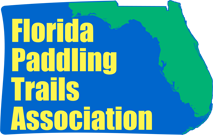Coastal, River and Blueway Trails
St Johns River Trail
All Maps and Info Sheets are downloadable and printable in an 8.5 X 11" format. For more information on mentioned boat ramps and paddle launches, please see Launch Sites and click on the icons for additional details.
St John's River Trail Segment 23 Information
This Segment consists of legs 8 through 15 of the Upper Basin of the 310 mile long north flowing river. It is the longest flowing river in Florida. Water levels vary considerably with rainfall amounts. Extremely high waters can occasionally inundate campsites, and extremely low water levels can make it almost impossible to get to some campsites. Paddling is recommended when water levels are at the moderate stage. Contact the St Johns River Water Management District for for water conditions. Always paddle with a flag on a high pole, as this is airboat country, and high grasses can prevent good visibility. Wind can be an important factor on some of the larger lakes that the St Johns passes through. Make sure to carry plenty of water and food on this Segment because there are few stops where you can resupply. Make sure you leave a good float plan. Carry good maps, a compass and GPS, as there are a lot of ribbon creeks in this Segment and it is easy to get lost. This part of the trail includes short portages around weirs. Leg 8 is particularly difficult when water levels are low. This Segment is recommended for advanced paddlers only. For more details contact the St Johns River Alliance. There is an abundance of wildlife along this trail including plenty of gators, shorebirds, eagles, ospreys and waterfowl. For the remainder of the St Johns River Trail, see Segments 22, 24 and 25.
NOTE : Great care has been taken to ensure this guides accuracy, but weather, tides, and water conditions can change rapidly and create hazardous conditions. These maps are for visual reference only, please consult NOAA Charts for navigation. Paddlers should have all proper safety equipment and check conditions before departure. All paddlers should always wear PFDs while on the water, and leave a float plan. There are inherent dangers in any paddle sport. There are special hazards along the Florida rivers due to shifting tides, changing wind and weather, water levels, and treacherous bottoms with soft mud, rocks, and possible deadfall. It is up to each paddler to be aware of these dangers, to accept and be prepared for the risks involved, and to be certain they have the skills to safely paddle in these conditions.
Download and Print Instructions:
Maps: To print out maps in full size, please left click on map below to pull up full size map, then right click on full size map and choose “Save Image As”. Save to your desktop or designated folder. Print from there.
Info Sheets: To print out Info Sheets, please click on the green Info Sheet button, then right click on the Info Sheet and choose “Save As”. Save to your desktop or designated folder. Print from there.
KMZ: For trip planning and navigation. To download the KMZ track file, click on the KMZ button. Once downloaded, locate the file on your computer and click on it. The file will then open in Google Earth. You must have the Google Earth or Google Earth Pro app on your computer or device. KMZ routes are for general navigation purposes only and may need to be adjusted for tidal and weather considerations.
Garmin Navigation User Instructions: The downloaded KMZ file can be directly uploaded to Garmin’s Homeport or BaseCamp app (Garmin Explore app for Garmin InReach devices) and then downloaded to any Garmin GPS device.
iPhone Navigation User Instructions: https://www.floridapaddlingtrails.com/iphone-cell-phone-navigation
Android Navigation User Instructions: https://www.floridapaddlingtrails.com/android-cell-phone-navigation

